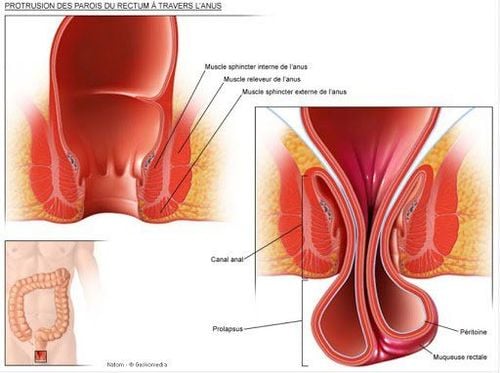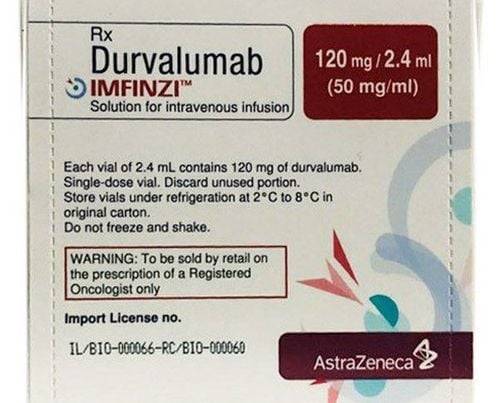This is an automatically translated article.
Anal cancer is an uncommon cancer that occurs in the short tube at the end of the rectum that carries stool out of the body. Anal cancer is rare, but the number of new cases is on the rise.
1. Current status of anal cancer
According to the American Cancer Society, in 2017 there were an estimated 8,200 cases of anal cancer; including 1,100 deaths. When detected early, anal cancer is highly treatable, with a 60 percent survival rate for the first five years after anal cancer diagnosis for men and 71 percent for women.
2. Early warning symptoms of anal cancer
The most common symptom associated with anal cancer is bleeding.
Anal itching can also be a symptom of cancer, at first many people assume that their bleeding and itching is caused by hemorrhoids leading to a delay in the diagnosis of anal cancer.
Symptoms of anal cancer can also be:
Pain or heaviness in the anal area Unusual discharge from the anus Feeling of a lump near the anus Change in bowel habits.

Triệu chứng phổ biến nhất liên quan đến ung thư hậu môn là chảy máu
3. Stages of anal cancer
3.1 Stage 0 In stage 0, abnormal cells are found in the lining of the anus. These abnormal cells can become cancerous and spread into nearby normal tissue. Stage 0 is also known as high-grade squamous intraepithelial lesion.
3.2 Stage I In stage I, the cancer has formed and the tumor is smaller than 2 centimeters.
3.3 Stage II Stage II anal cancer is divided into stages IIA and IIB.
In stage IIA, the tumor is larger than 2 cm to less than 5 cm. In stage IIB, the tumor is larger than 5 cm. 3.4 Stage III Stage III anal cancer is divided into stages IIIA, IIIB and IIIC.
In stage IIIA, the tumor is 5cm or smaller and has spread to lymph nodes near the anus or groin. In stage IIIB, the tumor can be any size but has spread to nearby organs, such as the vagina, urethra, or bladder, but has not spread to the lymph nodes. In stage IIIC, the tumor can be any size that has spread to nearby organs and has spread to lymph nodes near the anus or groin. 3.5 Stage IV In stage IV, the tumor can be any size but has spread to lymph nodes or nearby organs and has spread to other parts of the body, such as the liver or lungs .
4. Treatment of anal canal cancer

Tùy thụ thuộc vào giai đoạn ung thư, sức khỏe tổng thể và nguyện vọng của người bệnh để bác sĩ lựa chọn phương pháp điều trị khác nhau
Depending on the stage of cancer, overall health and the patient's wishes, the doctor chooses different treatment methods.
Doctors often treat anal cancer with a combination of chemotherapy and radiation, as these two treatments complement each other and increase the likelihood of cure.
4.1 Chemotherapy Chemotherapy drugs are injected into a vein or taken as a pill. The chemicals travel throughout the body and kill fast-growing cells, such as cancer cells. However, chemotherapy also damages fast-growing healthy cells such as those in the digestive tract and in hair follicles. This leads to side effects such as nausea, vomiting, and hair loss.
4.2 Radiation Therapy Radiation therapy uses high-energy beams to kill cancer cells. Radiation can damage healthy tissue near the irradiation site. Side effects include skin redness and sores in and around a person's anus, hardening and shrinking of the anal canal. Radiation therapy usually lasts 5 to 6 weeks. Your doctor will adjust your treatment schedule based on the characteristics of your cancer and your overall health.
Although combining chemotherapy and radiation will increase the effectiveness of the two treatments, it also makes the side effects more likely and more severe.
4.3 Surgery Doctors often use different surgical methods to remove anal cancer based on the stage of the cancer.
Surgery to remove early stage anal cancer. Anal cancer is so small that it can be removed through surgery. In this technique, the surgeon removes the tumor and a small amount of healthy tissue that surrounds it.
Because tumors are small, early-stage cancers can sometimes be removed without damaging the anal sphincter that surrounds the anal canal. The anal sphincter controls bowel movements, so doctors try to keep it intact.
Depending on the cancer, the doctor may also prescribe a combination of chemotherapy and radiation therapy after surgery.
If the cancer doesn't respond to chemotherapy and radiation, your doctor may recommend a larger surgery called an abdominoperineal resection. In this technique, the surgeon removes the anal canal, rectum, and part of the colon. The surgeon then attaches the rest of the colon to an opening in the abdominal wall so that waste will leave the body into a colostomy bag that is placed on the outside of the body.
4.4 Immunotherapy Immunotherapy uses the patient's own immune system to fight cancer. The body's disease-fighting immune system may not attack the cancer because the cancer cells make proteins that make them undetectable by immune cells. Immunotherapy works by interfering with this process. Immunotherapy is often indicated for people with advanced anal cancer.
4.5 Palliative care Symptomatic palliative care is provided from the time of diagnosis until the patient's death, including funeral arrangements for the patient. It is also a treatment model, which is respected and coordinated with other modalities such as surgery, radiation therapy, chemotherapy... during the patient's treatment, the aim is to help the patient. enjoy a good quality of life until the end of life.
In addition, palliative care has a special form for people who are dying and cannot live more than 6 months.
Symptomatic palliative care can be done at home or in a hospital and is performed by a dedicated team of carefully trained professionals including doctors, nurses, specialists from many fields, staff social workers, volunteers and family members. These people work together with the patient's other doctors for an extra support. Most of the work focuses on alleviating symptoms such as pain, shortness of breath, fatigue, constipation, nausea, loss of appetite, trouble sleeping, depression, etc. medical treatment, helping to assist in daily activities and improve understanding for better choice of treatment options.
Anal cancer, if not treated early and properly, will lead to many ominous and adverse health complications. Vinmec International General Hospital is one of the hospitals that not only ensures professional quality with a team of doctors, modern equipment and technology, but also stands out for its examination, consultation and treatment services. comprehensive, professional disease; civilized, polite, safe and sterile medical examination and treatment space.
Please dial HOTLINE for more information or register for an appointment HERE. Download MyVinmec app to make appointments faster and to manage your bookings easily.
Article referenced source: cancer.gov












